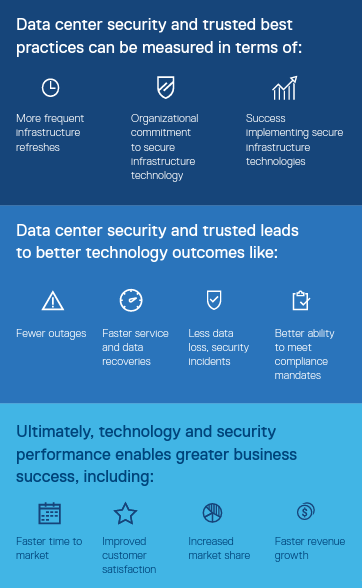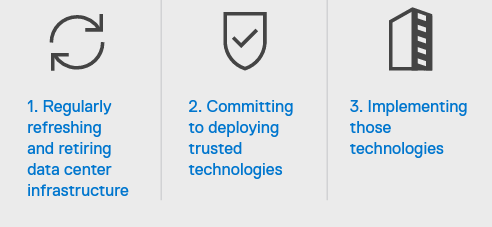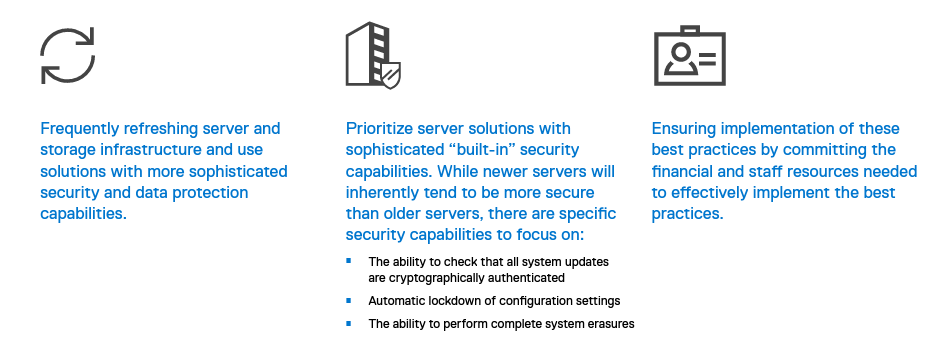

2023/05/03 Datacenter Solutions 1404 visit(s) 4 min to read
Ctelecoms

Medium-sized companies encounter comparable data center storage infrastructure issues as their enterprise counterparts but lack the same resources to address them. These issues include managing capacity, dealing with downtime, preventing data theft, and complying with regulations, all of which hamper their efforts to remain innovative in a competitive environment. To succeed, midmarket organizations must ensure that their valuable IT assets and data are always available, durable, scalable, and protected. The most successful companies in this segment make a clear commitment to prioritizing trusted data center infrastructure, particularly storage infrastructure, which leads to improved operational outcomes and ultimately, business success, as shown in Figure 1

To compete and succeed in their markets, medium-sized companies must prioritize enhancing the security and reliability of their IT environments, particularly their storage infrastructure, to mitigate risks that threaten their data. By minimizing the negative impact of storage disruptions, such as security breaches or data loss, midmarket firms can improve their ability to remain competitive. Any disruption in storage services can have serious consequences, including cyber threats that can harm an organization compared to its competitors, outages that can disrupt customer service, data loss that can reduce productivity, and compliance violations that can result in financial penalties.
As part of their security strategy, organizations should plan for refreshing and retiring their infrastructures. Newer infrastructure typically offers several security and data protection capabilities that older solutions may not have. Therefore, organizations that invest in infrastructure refreshes are better equipped to achieve improved outcomes in terms of security.

Trusted data center storage technologies include modern data security features like encryption, embedded firmware security capabilities, as well as data protection practices like backup frequency and replication.
Organizations that allocate more resources to infrastructure refreshes are better positioned to achieve improved outcomes.
In addition to refreshing infrastructure, organizations that achieve the greatest success in storage infrastructure also commit to several best practices, which include:
Successful organizations operate in more reliable, resilient, and secure environments, resulting in fewer security incidents that lead to data loss or compromise, fewer instances of non-compliance with internal governance or regulatory mandates, and fewer outages that are quickly resolved. This high level of technology performance allows businesses to outpace their competitors, enhance customer satisfaction, and increase market share and revenue. In addition, top-performing organizations prioritize compliance as a driver of IT and business risk, recognizing that compliance requirements can be stringent. For resource-constrained midmarket organizations, an efficient and effective approach to compliance is critical, these organizations are typically unable to bear the financial penalties associated with regulatory non-compliance.
Storage infrastructure outages can occur due to various reasons, such as natural disasters, human errors, or system failures. IT organizations that operate newer infrastructure and invest in high-security and high-reliability technology solutions tend to have better outcomes. Availability of storage infrastructure is crucial for ongoing operations and the development and delivery of new business services. A storage outage can have an immediate and noticeable impact on customers and other stakeholders who depend on those services. Additionally, it can disrupt development teams, as modern software development practices rely on agile and continuous development and delivery models. A storage outage can halt development efforts, result in the loss of development work, and require significant recovery time.
Organizations that focus on trusted data center technology, including storage services, find they are better positioned to innovate, deliver new products, and meet customer expectations. And those expectations are becoming more pronounced as consumers and other businesses take advantage of constantly available digital services. This increasing demand for constant access to business services increases the pressure to deliver both highly available and highly scalable applications.
Organizations that can operate such applications are better positioned to compete and grow. However, high availability and scalability are not enough to meet the needs of modern digital services. Organizations must also prioritize securing their customers' data, as data breaches can result in significant financial and reputational costs. Mid-market businesses can leverage trusted data center storage infrastructure to mitigate the risk of data breaches, ransomware, and other disruptive cybersecurity threats.

Ignoring security threats can lead to significant adverse impacts for any organization. The best practices for the Trusted Data Center storage infrastructure model align with the best practices used by enterprise-scale organizations to effectively address their storage, security, compliance, and operations requirements.
Ctelecoms offers a wide range of solutions designed to meet the unique data center needs and requirements of businesses in Saudi Arabia. If you're interested in learning more about our solutions and how we can assist your business, please don't hesitate to get in touch with us.